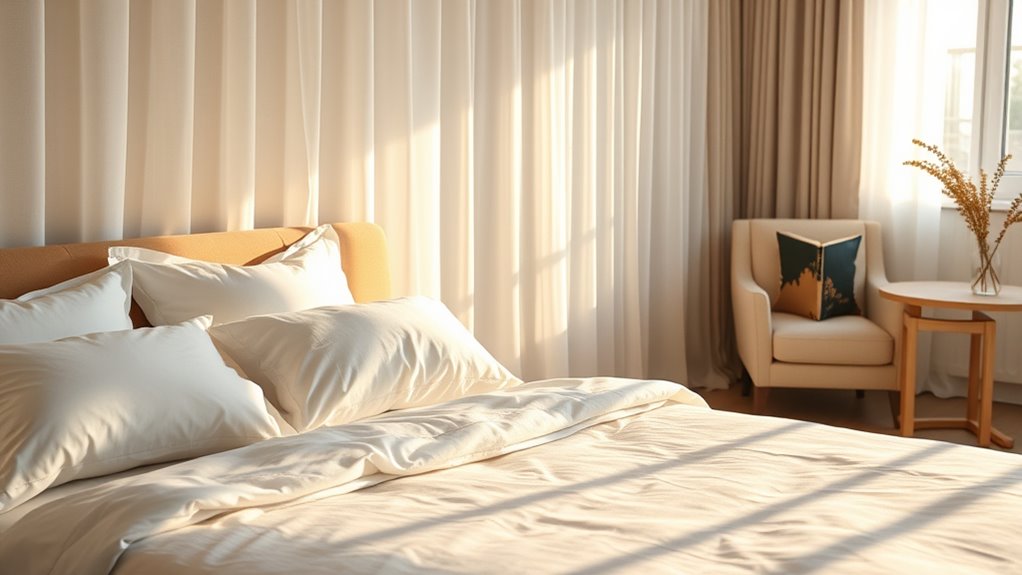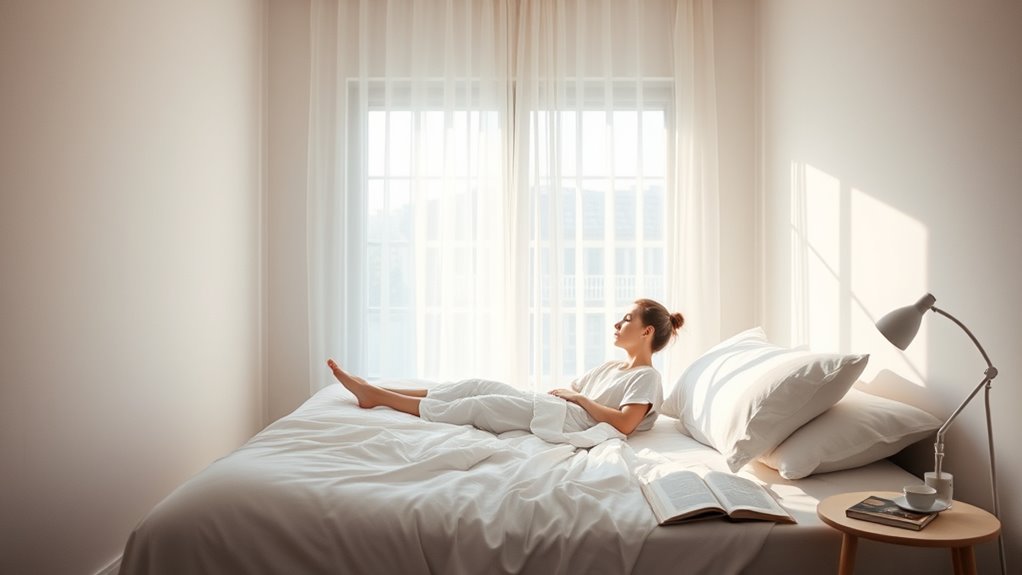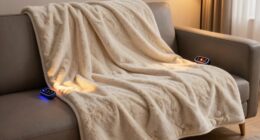Sleeping alone can boost your sleep quality by reducing disruptions from partner movements, snoring, or differing schedules. It gives you control over your environment, helping you create a comfortable space that promotes faster sleep and longer rest. This minimizes stress, supporting better mental and physical health. A peaceful night’s sleep strengthens your immune system, enhances mood, and improves memory. If you want to discover more benefits, keep exploring how a sleep divorce might make sense for you.
Key Takeaways
- Sleeping alone reduces sleep disturbances, leading to deeper, more restorative sleep and improved overall health.
- It allows customization of the sleep environment, enhancing comfort and sleep quality.
- Eliminating partner-related disruptions supports consistent sleep cycles and better mental and physical well-being.
- Sleeping solo decreases sleep-related stress caused by conflicts or differences in sleep habits.
- Better sleep quality from sleeping alone boosts immune function, mood, memory, and long-term health.

Sleeping alone can considerably improve your overall health by allowing you to enjoy more restful and uninterrupted sleep. When you don’t share your bed with a partner or a child, you’re more likely to experience better sleep quality, which is essential for your physical and mental well-being. Bed sharing often leads to disturbances—whether it’s a partner’s movement, snoring, or differing sleep schedules—that can fragment your sleep and reduce its restorative power. Without these interruptions, you can enter deeper stages of sleep more easily, waking up feeling refreshed and energized.
By sleeping alone, you’re in control of your sleep environment. You can optimize your bedroom’s temperature, lighting, and noise levels without accommodating someone else’s preferences. This control directly enhances sleep quality, helping you fall asleep faster and stay asleep longer. When bed sharing, you might have to compromise on comfort—perhaps sacrificing your preferred mattress firmness or blanket thickness—leading to less restful sleep. Sleeping alone eliminates these conflicts and allows you to customize your space for maximum comfort, which directly benefits your sleep health.
Moreover, sleeping alone reduces the likelihood of disturbances caused by your partner’s sleep habits. For instance, if they toss and turn or have irregular sleep patterns, these can jostle you awake or disrupt your sleep cycle. Even subtle movements or sounds can fragment your sleep, decreasing the proportion of restorative deep sleep and REM cycles. When you sleep alone, you avoid these disruptions, resulting in fewer awakenings during the night and better overall sleep quality. This consistency helps your body and mind fully recover, supporting immune function, memory, and mood stability.
Another benefit is the reduction of sleep-related stress. Sharing a bed can sometimes lead to disagreements or frustrations over sleep habits, which may cause stress and anxiety that interfere with your ability to fall asleep or stay asleep. Sleeping alone creates a peaceful environment free from these potential conflicts. It allows you to establish a sleep routine that works best for you, promoting relaxation and reducing stress levels. Additionally, having control over your sleep environment can help you implement sound masking techniques or other strategies that further enhance sleep quality. When you’re less stressed, your sleep becomes more profound and restorative.
Frequently Asked Questions
How Does Sleeping Alone Affect Long-Term Relationship Satisfaction?
Sleeping alone can improve your long-term relationship satisfaction by reducing conflicts over co-sleeping dynamics and ensuring better rest. When you prioritize individual sleep needs, you’re less likely to feel frustrated or exhausted, which benefits your connection. While shared sleep benefits include intimacy and bonding, sometimes creating space allows both partners to rest better, ultimately strengthening your relationship. Clear boundaries and understanding enhance mutual satisfaction and emotional health over time.
Can Sleeping Solo Improve Mental Health Beyond Physical Benefits?
Sleeping solo can boost your mental health by improving sleep quality, helping you wake up refreshed and less stressed. When you get better rest, your mental resilience strengthens, making it easier to handle daily challenges. Without disturbances from a partner, you can focus on your emotional well-being, reduce anxiety, and improve mood. Prioritizing your sleep environment allows you to nurture your mental health and face each day more resilient and balanced.
Are There Specific Sleep Disorders Better Managed by Sleeping Alone?
A problem shared is a problem halved, but some sleep disorders are better managed alone. If you suffer from snoring issues or restless leg syndrome, sleeping solo can reduce disruptions, helping you get better rest. Sleeping alone minimizes disturbances, allowing for targeted treatments. For these conditions, a sleep divorce isn’t just a luxury but a practical solution to improve sleep quality and overall health, making your nights more restful and rejuvenating.
How Does Sleeping Alone Influence Children’s Sleep Development?
Sleeping alone can positively influence your children’s sleep development by making sleep training easier and more consistent. When they have their own space, you can establish clear bedtime routines without interruptions, helping them feel secure and independent. This environment promotes better sleep habits, reduces night awakenings, and encourages self-soothing skills, ultimately supporting their overall sleep health and development as they grow.
Is Sleeping Alone Suitable for Couples With Different Sleep Schedules?
Sleeping alone suits couples with different sleep schedules like a glove, allowing you to dodge bed sharing challenges. You can customize your sleep environment to match each other’s needs, ensuring restful nights. With separate beds, you avoid tossing and turning, creating a peaceful sanctuary. This setup promotes better sleep quality, so you wake refreshed, ready to face the day, without sacrificing comfort or harmony.
Conclusion
Imagine slipping into a bed where the only sounds are your own steady breathing and the gentle hum of your thoughts calming down. Sleeping alone lets you reclaim your personal space, creating a peaceful sanctuary for your mind and body. With each restful night, you wake up feeling more refreshed and centered, ready to face the day. Sometimes, the best way to nurture your health is simply by embracing the quiet comfort of sleeping solo.








